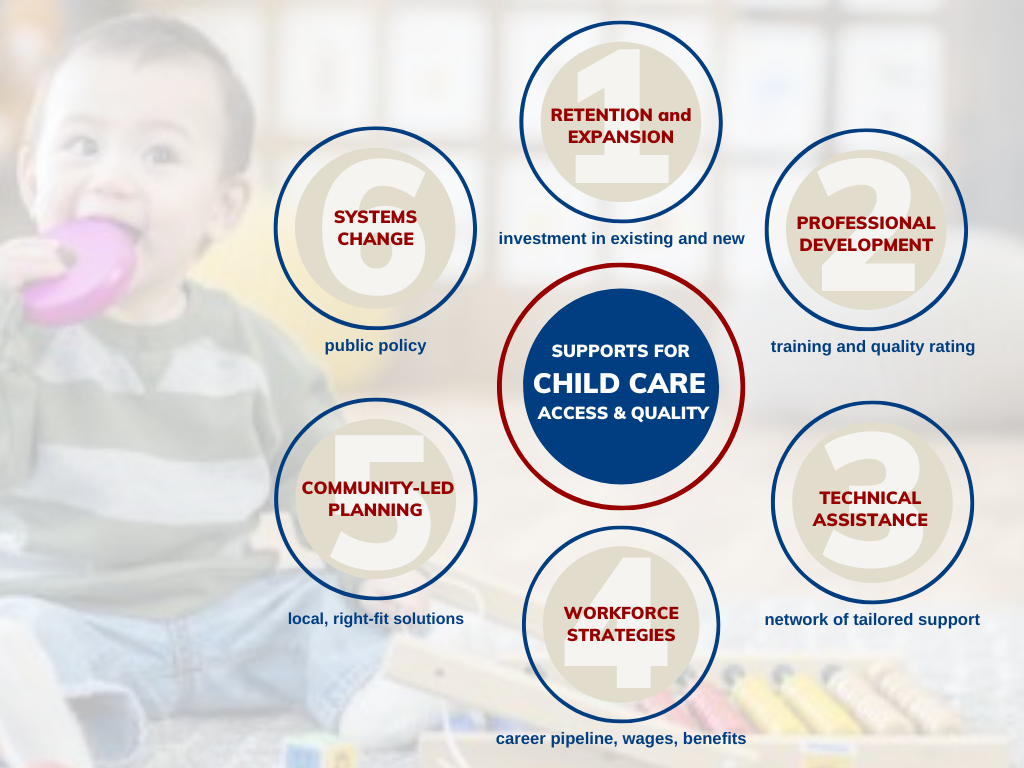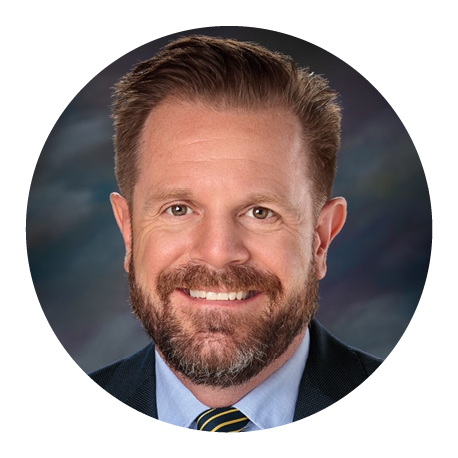
Partners, providers, and progress
Celebrating wins, laying out challenges in the race for child care solutions
A Ground-level View of the Crisis
Shawntel Gruba is well-versed in the joys and difficulties of child care in northeast Minnesota.
The native northeast Minnnesotan had two decades of experience in early childhood education before opening Iron Range Tykes Learning Center seven years ago. She knows her chosen profession is vitally important to a rural region where child care is tough to find. Yet, she says, this is an industry on the edge. Her Mountain Iron, MN, center has space for 90 children … and a perpetual two-year waiting list. This is the reality in most rural communities statewide. There is no two ways about it: access to affordable, quality child care is in crisis.
“The need is huge, my team is so dedicated, and families we serve are grateful to have quality care,” said Gruba. “It’s just really hard to make the math work. This is a highly regulated industry. We can’t cut corners to keep the lights on. Rising operating costs get passed on to families.”
Gruba and her business partner, Katie Mitrovich, both parents themselves, understand the plight of families, too. Federal affordability guidelines suggest child care should cap at about seven percent of household income. But, Gruba says, “I know people paying two, three, even four times that. People are being squeezed out of the workforce.”

“In too many cases, parents leave the workforce because there are simply no openings near them, or the cost is more than their household can bear. Meanwhile, a lot of providers are at a breaking point.” —Shawntel Gruba, CEO, Iron Range Tykes
Here for the Long Haul
For 20 years, the Northland Foundation has been at the forefront of early care and education in Northeast Minnesota, affording us and our many regional early childhood, economic development, and community partners with an inside view of the pain points. It has been a race of two steps forward, one step back, gaining new child care slots here, losing a center here or several family providers there. Nevertheless, we persist.
As Shawntel Gruba asserts, the system is in perpetual struggle mode. Providers are performing an essential service but are challenged to be profitable. Families can’t find care. Some parents add their names to years-long waiting lists and try to time pregnancy to coincide with their slot opening up. Strides have been made in educating stakeholders about the depth of the crisis, yet critical shifts in public policy and widespread private-sector support have not gained a permanent foothold.
Although the system is imperfect, progress is possible. The Northland Foundation’s comprehensive approach to supporting childcare providers has positively impacted two-thirds of northeast Minnesota’s 357 family and center-based licensed programs, while helping increase and sustain quality with training and quality rating initiatives. That the shortage of child care is slightly less than it was three years ago is a testament to the people and partners who are working the problem from every angle.
Six Strategies on Tap
There are a half dozen big buckets where our efforts have focused, in concert with many partners, providers, and community members who are equally invested in solving this challenge.
- Expansion and Retention: Aiming financing and funding to rural providers to start, grow, and sustain.
- Technical Assistance: Assembling a no-cost network of mentors and business advisors.
- Professional Development: Reducing barriers to accessing training and pursuing quality rating.
- Workforce Strategies: Supporting providers to implement practices to attract and keep staff.
- Community-led Planning: Facilitating a process in rural communities to find site-specific solutions.
- Systems Change: Advocating for public policy change and increased private sector investment.

Expansion and Retention
Since 2017, we’ve helped launch or grow 46 child care programs creating 1,765 new slots thanks to $1.2 million in state funding through the Minnesota Department of Employment and Economic Development (DEED). Although it is a fairly modest amount of funding, it helped child care businesses to access nearly $18 million more in other investments to support their projects. Northland has also served in this role for county government, directing $750,000 in ARPA funds toward 23 child care programs. Altogether, ARPA funding helped providers add 267 new child care slots and retain another 855 that otherwise may have been lost.
Funding for expansion continues. In 2025, we’ll support up to 10 more projects with a $240,000 DEED grant.
Technical Assistance
Besides funding, providers have asked for help with business planning, financing, and regulatory concerns. They are looking for thought partners who understand their unique challenges. Inquiries flow in from individuals looking to open or strengthen their child care business, and we connect them to tailored support including one-on-one help from experienced child care navigators.
The Northland Small Business Development Center is alhas provided over 400 hours in no-cost business consulting services to 46 providers in last three years alone. Child care ranks as the 4th most common industry type served by our SBDC—highlighting both the critical need and our focused response.
We hold regular resource coordination meetings with partners like Child Care Aware and First Children’s Finance. Northland also hosts listening sessions with the Minnesota Department of Human Services where providers in our rural region share their insights and experiences to inform DHS as it considers changes to licensing standards and policies.
Professional Development
Knowledgeable, developmentally and culturally appropriate care is vital to quality. Annually, the Northland Foundation hosts or supports 20 to 30 free or low-cost trainings for over 750 caregivers, lowering the cost barriers to professional growth. Through our Parent Aware Pathways program, we provide resources and incentives—like sign-on bonuses and curriculum tools—to support providers on their quality rating journey.
Our annual appreciation and training event, launched in 2008, continues to celebrate and elevate the child care workforce. This past spring in partnership with Child Care Aware, more than 200 providers gathered at the DECC in Duluth for DEVELOP-approved training sessions, lunch, and the chance to network with fellow providers from across the region.
Workforce Strategies
Solving the crisis means finding ways to bring, and keep, more trained and caring people into the field with compensation and benefits that keep them there. Strategies include the Jump Into Child Care program which provides free training to help individuals explore and launch careers in child care, especially in the Duluth area. And, with funding from area partners, a Workforce Solutions pilot project distributed grants to 62 licensed programs to implement staff recruitment and retention efforts including bonuses, wellness activities, and professional development.

“Northland and so many others have been at this work for a long time. But, we—the collective we—can’t rest, because the underlying issues that led to this crisis still exist.” —Tony Sertich, President, Northland Foundation
Community-Led Planning
We’re supporting planning cohorts led by our partner, Northspan, in places like Silver Bay, East Range, Hibbing-Chisholm, and now Cloquet. Northspan facilitates an organizing process that guides a local contingent to explore different child care ideas and create actionable plans based on the needs, assets, and gaps of that particular site. When a diverse group community members is involved, actively engaged, and guided by expert facilitators promising ideas emerge.
Systems Change
Real change requires systemic thinking. We work to amplify providers’ voices in policy-making, pilot innovative ideas that demonstrate workable models, and connect the dots across organizations.
A main principle of all of our work is relationship-building and helping connect people and organizations together. We also help ensure people and in our region’s voices are heard in statewide policy efforts by holding focus groups, gathering survey input, sharing information at statewide meetings and, when asked, testifying at the legislature.
Area providers including Shawntel Gruba have stepped up to advocate for policy changes directly. Says Gruba, “I speak out in northern Minnesota and in St. Paul because we want the people elected to serve our communities to understand the realities we face, be inspired by our stories, and use their legislative power to support this critical industry.”
Some examples of systems change work in the early care and education include:
- Efforts to increase the number of Parent Aware rated programs in the region.
- Strengthening relationships and information exchange among all the different entities working to support child care including County/Tribal Licensors, DHS, First Children’s Finance, Child Care Aware, Economic Development efforts, Workforce Development, etc. to help people and programs get access to the support they need while maximizing resources and minimizing duplication.
- Piloting projects including Family Navigators and Family, Friend and Neighbor Child Care resources and supports.
- Giving more licensed family and center-based providers in our rural region a chance to be heard and provide feedback as the Department of Human Services drafts improvements to the licensing standards.
- Offering no- and low-cost cultural learning opportunities for people working with young children and families.
Until much-needed policy shifts come, we must work within the system we have to find every foothold that will keep child care going. Together with providers, communities, and policymakers we push on. Families, children, employers, and our region’s ability to thrive are at stake.
Until much-needed policy shifts come, we must work within the system we have to find every foothold that will keep child care going. Together with providers, communities, and policymakers we push on. Families, children, employers, and our region’s ability to thrive are at stake.